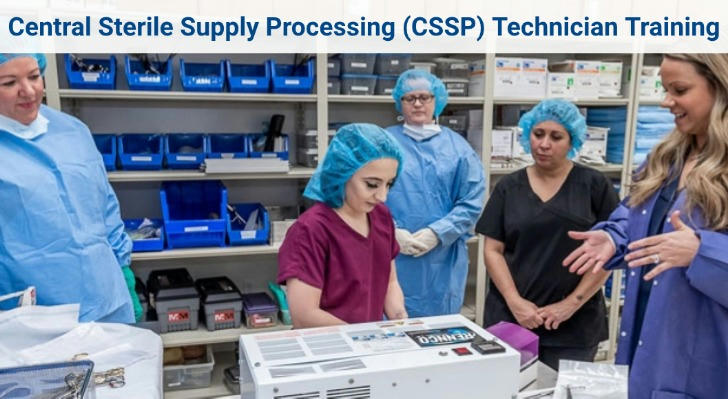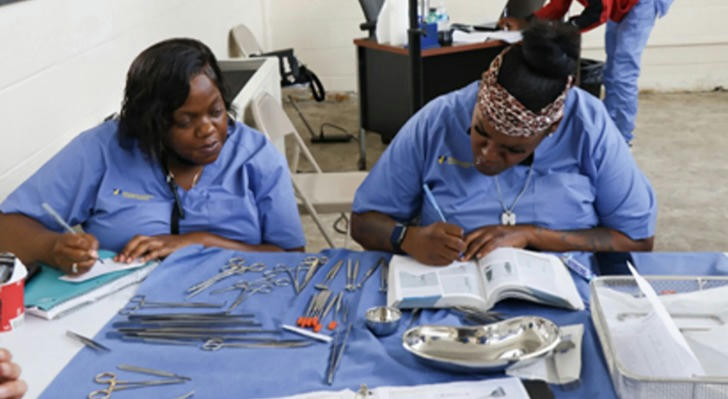Sterile Processing Technician Training: No Experience Needed to Start the Sterile Technician Certification Course
The Central Sterile Technician Course offers a potential entry into the healthcare field, especially for those with no prior experience. As surgical procedures continue to rise, interest in trained sterilization support staff is increasing across medical facilities. Through Sterile Processing Technician Training, learners are introduced to the core practices of medical instrument sterilization and infection control.
Completing the Sterile Technician Certification Program helps build foundational skills for those seeking employment opportunities in hospitals, clinics, or outpatient centers. Students are eligible to take the CRCST certification exam administered by the Healthcare Sterile Processing Association (HSPA).
Take the first step today—Apply for cssp training and start your high-paying, stable career journey in healthcare!

I. CSSP Technicians: Secure a Lucrative, In-Demand Career in Healthcare
CSSP technicians play a critical role in maintaining the sterility of surgical instruments, directly impacting patient safety. With an aging population and growing surgical demand, the U.S. Bureau of Labor Statistics projects a 10% job growth in this field from 2022 to 2032—reflecting strong stability and opportunity.
Key Benefits of a Career as a CSSP Technician:
Robust Job Growth A projected 10% increase in demand ensures long-term career stability.
Competitive Salaries Entry-level CSSP technicians typically earn between $29,000 and $33,000 per year, with experienced professionals often exceeding $46,000.
Essential Role in Healthcare CSSP technicians help prevent infections and maintain safety in hospitals and surgical centers.
Ongoing Skill Development Continuous learning supports advancement and adaptation to new technologies and standards.
II. Why Choose the CSSP Training Program?
Pursuing a career in Central Sterile Supply Processing (CSSP) opens doors to a stable and in-demand healthcare profession. With hospitals and surgical centers relying on sterilization experts to maintain patient safety, trained technicians are essential.
Program Benefits:
Practical Training — Learn sterilization procedures, infection control, and instrument processing.
Job Security — Strong demand in hospitals, clinics, and surgical centers.
Career Growth — Advance to specialized or supervisory roles with experience and certification.
Industry Recognition — Upon completing the Central Sterile Technician Course, participants will be eligible to take the Certified Registered Central Service Technician (CRCST) provisional certification exam administered by the Healthcare Sterile Processing Association (HSPA).
III. CSSP Training Program Curriculum
The program offers both theoretical and practical training to prepare participants for real-world medical environments.
Core Modules:
Fundamentals of Sterile Processing
Intro to sterilization techniques, infection control, and safety standards.
Surgical Instrumentation
Identification and maintenance of tools used in surgical procedures.
Decontamination Procedures
Proper cleaning and sterilization of medical equipment.
Storage & Distribution
Managing sterile supplies across healthcare settings.
Regulatory Compliance
Understanding OSHA, CDC, and industry guidelines.
Hands-On Training:
Practice with hospital-grade sterilization equipment
Simulated labs for decontamination and packaging
Live demonstrations of surgical tool handling and storage
Upon completion, participants are well-prepared for industry certification exams and job placement in medical facilities.

IV.How apply for cssp training
To apply, you need:
High School Diploma or GED
Web browser with internet connection
Course registration & payment
No prior experience required.
Application Steps:
Choose an accredited CSSP training program
Submit your application and proof of education
Complete any required orientation
Enroll and begin your training
V. Start Your Healthcare Career Today
Now is the perfect time to enter the CSSP field. With growing demand across the healthcare system, this career path offers strong stability and long-term potential. By starting your training today, you can gain valuable skills and move toward a rewarding role in a critical area of patient care.
